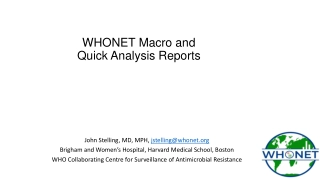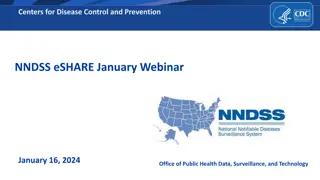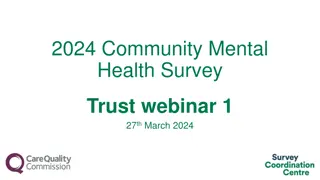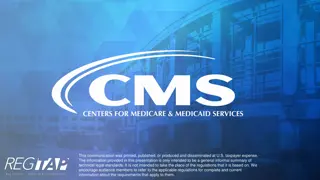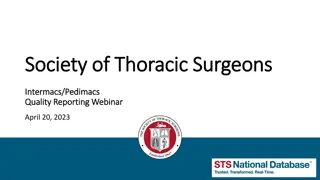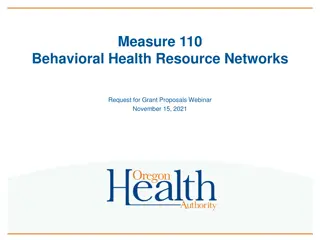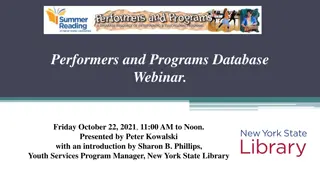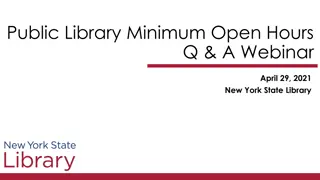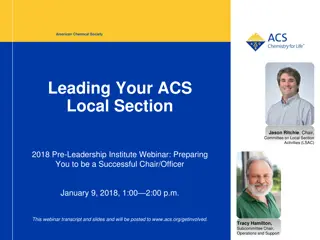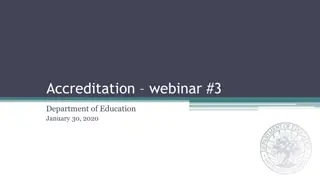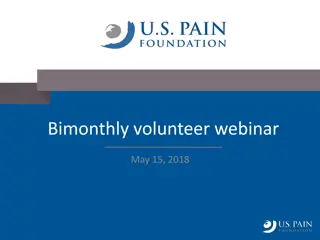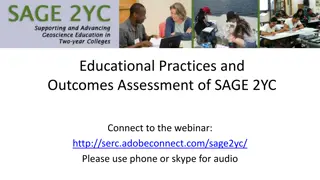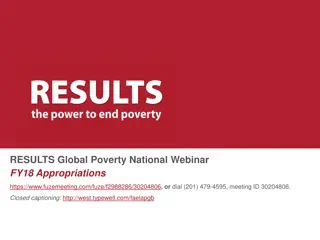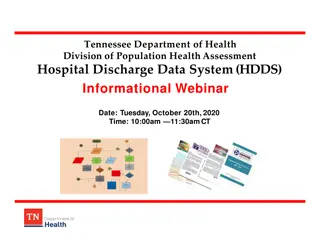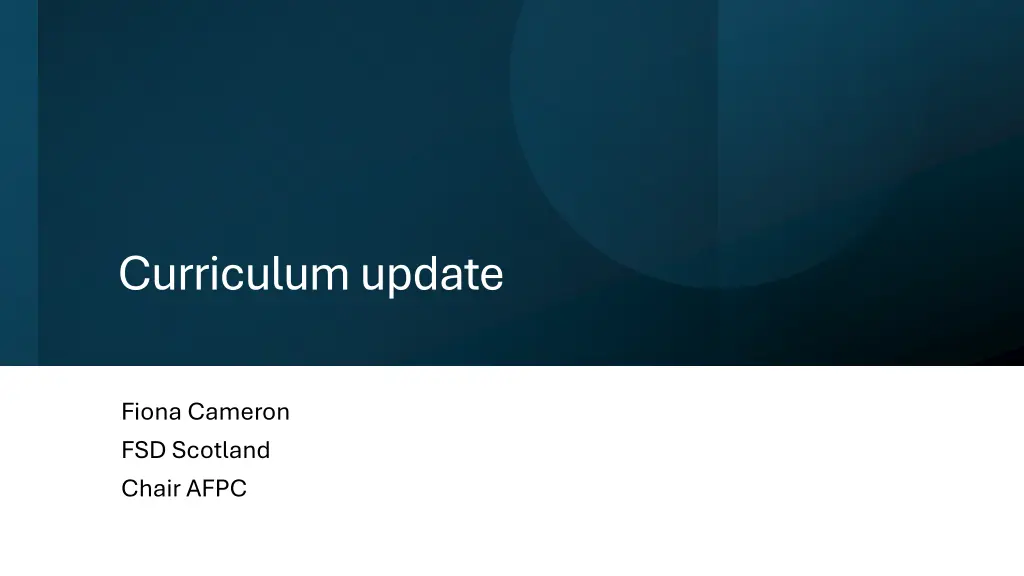
Professional Capabilities and Curriculum for Healthcare Program
This comprehensive content covers the curriculum updates, foundation programme details, holistic care principles, thirteen professional capabilities, hierarchy of evidence, and ARCP requirements for doctors in the healthcare field. It emphasizes the importance of developing essential skills, knowledge, and ethical practices required for healthcare professionals. The content provides valuable insights into the educational framework and core competencies necessary for a successful career in healthcare.
Download Presentation

Please find below an Image/Link to download the presentation.
The content on the website is provided AS IS for your information and personal use only. It may not be sold, licensed, or shared on other websites without obtaining consent from the author. If you encounter any issues during the download, it is possible that the publisher has removed the file from their server.
You are allowed to download the files provided on this website for personal or commercial use, subject to the condition that they are used lawfully. All files are the property of their respective owners.
The content on the website is provided AS IS for your information and personal use only. It may not be sold, licensed, or shared on other websites without obtaining consent from the author.
E N D
Presentation Transcript
Curriculum update Fiona Cameron FSD Scotland Chair AFPC
2021 Foundation Programme Curriculum
Holistic care and breadth of care There is a focus on: Physical health Mental health Social health Acutecare(includingacutementalhealthcare) Physicalhealth Mentalhealth Themanagementofchronicillness Communitycare(includingpopulationhealth) Across a variety of different areas: Community or primary care Acute and chronic hospital environments Mental health settings Environments that provide health promotion Socialhealth
Thirteen professional capabilities Thirteen professional capabilities The 3 HLOs are broken down into 13 professional capabilities, which form the syllabus: HLO2: THE HEALTHCARE HLO2: THE HEALTHCARE THE CLINICIAN HLO1: THE CLINICIAN HLO1: THE CLINICIAN THE HEALTHCARE WORKER WORKER WORKER HLO3: THE PROFESSIONAL HLO3: THE PROFESSIONAL Direct and indirect patient care: 1. Clinical Assessment 2. Clinical Prioritisation 3. Holistic Planning 4. Communication and Care 5. Continuity of Care Integrating into the healthcare workforce: 6. Sharing the Vision 7. Fitness to Practise 8. Upholding Values 9. Quality Improvement 10.Teaching the Teacher Professional requirements and expectations: 11.Ethics and Law 12.Continuing Professional Development 13.Understanding Medicine These capabilities can be demonstrated by behaviour in the workplace during the programme
Hierarchy of evidence HLO 1&2 - Performance in the clinical environment (SLEs) should form the majority of evidence Experientia l (SLEs) Does (observation) HLO 3 - largely evidenced by teaching records and reflection. Shows how (demonstration of skills) Simulation HLO1: An accountable, capable and HLO1: An accountable, capable and compassionate clinician compassionate clinician Learning / reflection Knows how (application of knowledge) HLO2: A valuable member of the HLO2: A valuable member of the healthcare workforce healthcare workforce Knows (knowledge) HLO3: A professional, responsible for HLO3: A professional, responsible for their own practice and portfolio their own practice and portfolio development development Millers pyramid Hierarchy of Evidence
ARCP requirements Provisional registration and a licence to practise with the GMC (F1 only) To undertake the first year of the foundation programme, doctors must be provisionally registered with the GMC and hold a licence to practise. In exceptional circumstances (e.g. refugees), a fully registered doctor with a licence to practise may be appointed to the first year of a foundation programme. Full registration and a licence to practise with the GMC (F2 only) To undertake the second year of the foundation programme, doctors must be fully registered with the GMC and hold a licence to practise. The maximum permitted absence from training, other than annual leave, is 20 days (when the doctor would normally be at work) within each 12 month (WTE) period of the foundation programme. Where a doctor s absence goes above 20 days, this will trigger a review of whether they need to have an extra period of training (see GMC position statement on absences from training in the foundation programme June 2013). The report should draw upon all required evidence listed below. If the FD has not satisfactorily completed one placement but has been making good progress in other respects, it may still be appropriate to confirm that the FD has met the requirements for progression. An Educational Supervisor s End of Placement Report is required for all FD placements. Completion of 12 months (WTE) training (taking account of allowable absence) A satisfactory Foundation Programme Director s End of Year Report Satisfactory Educational Supervisor s End of Placement Reports Satisfactory Clinical Supervisor s End of Placement Reports A Clinical Supervisor s End of Placement Report is required for ALL placements. At least one CSR in each level of training must make use of PSG feedback. All of the clinical supervisor s end of placement reports must be completed before the doctor s Annual Review of Competence Progression (ARCP). A combined report can be submitted at the end of each placement when a senior Clinician holds both ES and CS roles for the FD Minimum of one per level of training Minimum of one per level of training The FD should provide evidence that they have met the 13 foundation professional capabilities, recorded in the eportfolio. Evidence to satisfy FPC1 Evidence to satisfy FPC1- -5 must include direct observation of at least 5 clinical encounters in the form of SLEs and 5 must include direct observation of at least 5 clinical encounters in the form of SLEs and the specific life support capabilities specified in FPC2. the specific life support capabilities specified in FPC2. Learning log of core/non-core teaching and other learning Reflection including summary narrative Contemporaneously developed portfolio Engagement with feedback on training programme Completion of relevant probity / health declarations including Form R / SOAR or equivalent The F1 doctor must provide evidence that they have passed the PSA within two years prior to entry to the programme or on completion of the programme. Satisfactory Combined Supervisor s End of Placement Report Satisfactory Team Assessment of Behaviour (TAB) Satisfactory Placement Supervision Group report (PSG) Satisfactory completion of all curriculum outcomes Satisfactory engagement with the programme Successful completion of the Prescribing Safety Assessment (PSA) - (F1 only)
ARCP requirements ARCP checklist - UK Foundation Programme
Challenges Delivering difficult feedback Assessing the adequacy of formative learning in the context of no specific numbers of SLEs Assessing the adequacy of formative learning noting the parity of mental health How to manage the PSG when a concern has been recorded by one or more respondents How to review and feedback on the summary narrative
How do we ensure adequacy of formative assessment with no SLE numbers Challenging Remember Millers pyramid Each FPC must have appropriate evidence linked to it In HLO each FPC (1-5) should have several SLEs including mental health however if the SLE presented for the FPCs is clearly adequate to evidence the curriculum then the ES/ CS can accept this as adequate The 2021 curriculum relies on the experience of the senior trainers to make a judgement and assessment of the trainees evidence.
Each FD is required to provide 1 satisfactory PSG report per training year PSG provides feedback on clinical care, quality and safety, teamworking and partnership with colleagues and staff. How to manage the PSG when a concern has been recorded by one or more respondents It can be used to document excellence It provides different information to the TAB which focusses on communication and accessibility
What to do with a noted concern on the PSG Feedback can be No concern Some concern Major concern major concern - this needs to be triangulated, further information will be required and may need further feedback Minor concern- consider this as areas for development; Review the portfolio and decide if there is alternative evidence provided to show that this is closed and remediated It may be necessary to repeat the PSG however this is not an absolute necessity of other positive evidence is provided.

